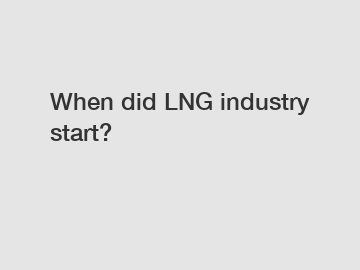When did LNG industry start?
When Did the LNG Industry Start?
The LNG (liquefied natural gas) industry has become a significant player in the global energy market, contributing to the diversification of energy sources and the reduction of greenhouse gas emissions. However, not many people are aware of when this industry first began. In this article, we will explore the origins of the LNG industry, its growth over the years, and its current importance in meeting the world's energy demands.
The Early Beginnings and Technological Advancements.

1. The Birth of the LNG Industry.
The LNG industry traces its roots back to the 19th century when the idea of liquefying natural gas was first proposed. The first successful attempt to liquefy natural gas occurred in 1912 by a British engineer named William Knox D'Arcy. However, it wasn't until the 1950s that the first commercial-scale LNG plant was established in the United States.
2. The Development of LNG Technology.
The development of LNG technology can be attributed to several key advancements. In the 1930s, the discovery of efficient refrigeration systems facilitated the storage and transportation of LNG. Additionally, the improvement of cryogenic materials and insulation techniques in the 1940s increased the viability of LNG as a commercial energy source.
The Growth and Expansion of the LNG Industry.
1. The Expansion to Europe and Asia.
During the 1960s, the LNG industry experienced significant growth and expansion. The first LNG export project in Alaska began operating in 1969, supplying LNG to Japan. This marked the beginning of LNG trade between the United States and Asian markets. Furthermore, the development of the Groningen gas field in the Netherlands led to the establishment of LNG facilities in Europe in the same decade.
2. The Emergence of Major LNG Players.
In the 1970s and 1980s, major players in the LNG industry emerged. Countries such as Qatar, Algeria, and Indonesia became significant exporters of LNG. Qatar, in particular, entered the global stage as a major LNG producer, leading to its current status as the world's largest exporter of LNG.
The Role of the LNG Industry Today.
1. Meeting Growing Energy Demand.
In recent years, the global demand for natural gas has witnessed significant growth. As countries move towards cleaner energy sources and away from coal, natural gas, including LNG, has become an essential fuel for power generation. The LNG industry plays a crucial role in meeting this growing energy demand, especially in regions lacking domestic gas reserves.
2. Reducing Environmental Impact.
The use of LNG also contributes to lowering greenhouse gas emissions. Compared to other fossil fuels, natural gas emits significantly fewer pollutants, making it a cleaner-burning energy source. As countries strive to reduce their carbon footprint, the LNG industry provides an important solution for transitioning to cleaner energy without compromising energy security.
Conclusion.
From its humble beginnings in the early 20th century to its current widespread usage, the LNG industry has come a long way. It has become an indispensable component of the global energy sector, delivering clean and reliable energy to consumers. As the demand for natural gas continues to grow, so does the importance of the LNG industry. To learn more about the LNG industry and its impact on the energy market, feel free to contact us.
Contact us for more information and expert advice on the LNG industry's current state and future prospects.
For more information, please visit LNG, CNG, LPG and Industrial Gas solution, industrial Gas Storage Equipment, LNG, CNG, LPG and Industrial Gas solution.
196
0
0

Comments
All Comments (0)